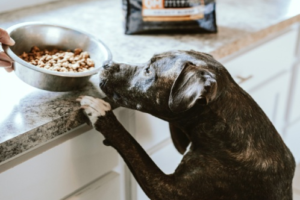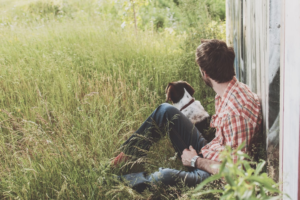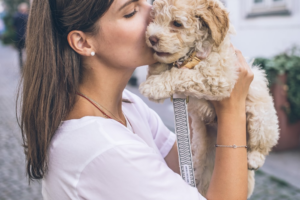Have you noticed a change in your doggie’s behavior? Is he acting out? Or has he become a recluse? If your playful, cheerful dog is not acting like his usual self, it is definitely a cause for worry.
Sometimes this behavior might indicate internal health problems. Drawing away from everyone or acting aggressively might be his way of telling you that he is in pain. So the first thing to do is to take your dog for a quick check-up at the vet. If you notice any other troubling behavior, make a note of it to discuss it with your vet. These behaviors can include aggression, a change in sleeping and eating habits, etc.
Once the vet has cleared him of any physical ailments, you might want to dig in deeper to find out what exactly is causing this behavior in an otherwise healthy dog. These are classic signs of canine depression, and it could very well mean that your dog is depressed.
Canine depression is as real as human depression. There are several telltale signs that you can pick up on to ascertain if your dog is really depressed and lonely. Don’t worry, though, with enough love, care, and attention, you can help your doggie fight this battle and go back to his usual happy, chirpy self. Your support and presence during this time will make all the difference to your dog.
First things first, though, you have to keep a keen eye on your dog. He is your responsibility, and you should be observant of any disturbing behavior. Spending some time regularly with your dog can usually keep you up-to-date on how he is and help you notice any issues early on so you can nip it in the bud. Here are five worrisome signs to look out for in your dog.
1. Aggression
A trained, playful dog suddenly exhibiting aggressiveness inside the house with people he is familiar with and friendly with is a cause for concern. Aggressiveness in an otherwise gentle and loving dog is always indicative of underlying issues, instead of mere open and explicit hostility.
Sudden aggressiveness is one of the most obvious signs of canine depression and loneliness. Showing aggressive behavior includes growling, baring his teeth, breaking and ripping household things apart, or even trying to bite you if you get too close. If your dog is displaying this behavior, despite getting a clean bill of health from his vet, he is probably depressed.
2. Appetite Loss
Appetite loss is also another classic mark of depression, much like in humans. Observe if your dog’s eating habits and preferences have changed too drastically. Is your dog refusing to eat his favorite brand of dog biscuits, and even denies treats if offered? Is he straight up starving himself? On the flip side, he might even be eating too much.
Eating too little or too much could escalate to cause other health problems in your dog. A vet can guide you on what to do in this regard. He might prescribe medication to regulate your dog’s appetite or give him IV infusions to keep him hydrated and healthy. You might even have to force-feed your dog if necessary.
3. Avoidance
Is your normally cuddly buddy avoiding you and other people in the house? Dogs usually love human and canine company. They are energetic and playful and enjoy being showered with attention and adoration. If your dog is actively choosing to avoid this, it is not normal dog behavior.
Is he picking out remote, out-of-the-way corners in your house to sleep in and hides under the bed or other furniture all day? Hiding and reclusive behavior is also an indication of dog depression, and if your dog isn’t seen anywhere around people all day and prefers to sit by himself, doing nothing, then you need to take him to a vet because it’s very likely that he’s depressed.
4. Sleeping Patterns
Changing sleeping patterns, such as sleeping all day or not sleeping at all are, again, very problematic. Monitor your dog if you suspect something, and observe what sleeping routine he is following. If he is sleeping excessively, has low energy levels, and is not up for playing fetch or going out for a walk in the evening with you, there is something wrong.
On the other hand, not getting sufficient sleep is also disturbing and unhealthy. If you have noticed a pattern of unusual sleeping behavior in your dog, maybe you should take him to the vet for a proper diagnosis.
5. Wetting and Spoiling Indoors
Another revealing symptom of canine depression is wetting indoors. A perfectly trained dog that has never given any trouble to its owners and has displayed no behavioral issues before can start to make it a habit to relieve himself inside the house, spoiling your clothes, furniture, rugs, and carpets. The infrequent occurrence of this can be discarded as accidents, but if you notice this becoming a habit, you have to take action. It could be a tricky situation to circumnavigate. Rebuking him will make him even more depressed and will not help the problem at all.
These signs, along with many others, like dismissing your commands and not responding to your calls, can warn a pet owner that their dog might not be feeling his best. It might be a cry for help, and as a dog parent, it is your responsibility to tend to him.
Do not take canine depression lightly and dismiss it, thinking he will get over it. Your dog might be dealing with a lot of mental stress and sadness, and you should not let him suffer alone. Play your part; be there for him, assure him of your presence, give him some extra love, and cuddle and play with him more than usual. Do not let him miss out on his doggie walks and regular exercise.
Also, take him to a dog park frequently where he can mingle with other dogs and puppies and play with them. No matter how much they love you, dogs enjoy spending time with their own kind too, and regular, healthy interaction with other dogs just might be what he needs.
If you can’t take out the time to take him out every day, drop him off at our daycare at Twissted Whiskers, where he will have plenty of delightful doggie company! Find out more about our doggie daycare on our website.





